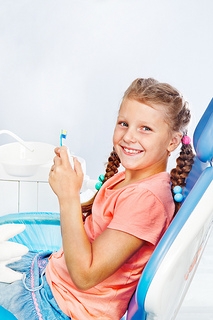
First word, first step, first day of school—these firsts are milestones every parent celebrates. And one of the earliest and most precious milestones is your baby’s first real smile!
Keep that smile beaming and healthy from infancy to young adulthood with the help of dental milestones. These breakthrough events mark significant stages in oral development, and are a great guide to understanding, protecting, and supporting your child’s path to adult oral health.
Baby’s first tooth often arrives around the age of six months. And this is the time to start cavity prevention, with twice daily gentle brushing with a soft-bristled, child-sized toothbrush. Talk to Dr. Gregory Weaver or your child's pediatrician to learn how and when to brush and how much and what kind of toothpaste to use.
By the age of three, toddlers typically have all of their 20 baby teeth, and these little teeth are essential to children’s health. They help kids chew and eat, assist speech development and pronunciation, and act as placeholders so adult teeth can erupt in the proper place. Keep your child’s baby teeth their healthiest by partnering with the dental team at Weaver Dentistry in Raleigh, NC.
- First Visit to the Dentist
Once that first tooth has come in, or around age one, it’s time to bring your little one to the dentist for a first visit. Your dentist will do a careful exam to see if your child’s teeth and jaws are developing as they should, check the health of the teeth, and answer your questions about brushing, flossing, toothpaste, teething, pacifiers, thumb-sucking, or any other concerns.
Early visits are important. They allow you and your child to establish a “dental home”: a place where the dental team is familiar and comforting, and where regular preventative care will help keep young smiles their healthiest.
- First Lost Tooth/First Permanent Tooth
Around age six, most children start to lose baby teeth, typically in the order in which they arrived. Losing a baby tooth is a big step for children and might be a bit scary. You can celebrate this milestone with a visit from the Tooth Fairy, or a certificate, or a new toothbrush in your child’s favorite color.
As the permanent teeth come in, continue to encourage twice daily brushing and flossing, and consider proactive treatment with dental sealants. Even when children have learned to brush properly, and brush twice each day, it can be hard for kids to remove all the plaque and food particles from the grooved chewing surfaces on top of molars. That’s why molars are much more vulnerable to decay than any other teeth.
Around the time your child’s first permanent molars erupt, the team at Weaver Dentistry might suggest sealants. Sealants protect the chewing surfaces of the molars from food particle and plaque buildup. This safe and invisible protective coating, usually a plastic resin, is applied in the office and typically lasts from three to five years.
Dentists and orthodontists recommend an orthodontic examination by age seven (or earlier, if you have any concerns). At this point, children have a mix of primary and permanent teeth, allowing an orthodontist to assess tooth spacing and alignment and the way the jaws fit together.
Your orthodontist might find no issues with your child’s teeth or bite. Or, perhaps, follow-up appointments might be scheduled to determine if and when future treatment is advisable. Sometimes, because some problems can be treated more easily when your child is young, early intervention with a fixed or removeable appliance is recommended right away.
Having an orthodontic plan in place helps ensure that children benefit from the most effective and timely treatment at any stage of their development.
Orthodontic treatment commonly begins in early adolescence (ten to 14) when most or all of the permanent teeth have erupted. The facial and jaw bones are still growing in preteens and young teens, which makes it easier to reposition teeth and guide jaw alignment.
More treatment options are available than ever before—and today’s braces, clear aligners, smaller and more comfortable appliances, and even 3D technology make treating malocclusions and misalignments more efficient than ever before.
A healthy bite and properly aligned teeth are a foundation of lasting oral health. Orthodontic treatment helps prevent decay, gum disease, jaw pain, and even early tooth loss. And, of course, the value of your child’s increased self-confidence is impossible to overestimate!
Wisdom teeth, or third molars, generally start to erupt in the late teens or early twenties and often have a harmful effect on oral health.
Erupting or impacted wisdom teeth can push neighboring teeth out of position, damage adjacent tooth roots, and cause inflammation and infection in gum and bone around the wisdom tooth. For these reasons, preventative extraction is often recommended.
If your teen shows any symptoms of erupting or impacted wisdom teeth—irritated, swollen, or bleeding gums, bad breath, jaw pain or swelling—a visit to the dentist is in order.
As parents, you do your best to guide your child’s journey from infancy to healthy adulthood. Each dental milestone marks a new stage in your child’s oral health journey, and new ways for you to encourage and protect that oral health. Use these milestones to set your child up for a lifetime of good dental habits—and a lifetime of healthy smiles!




